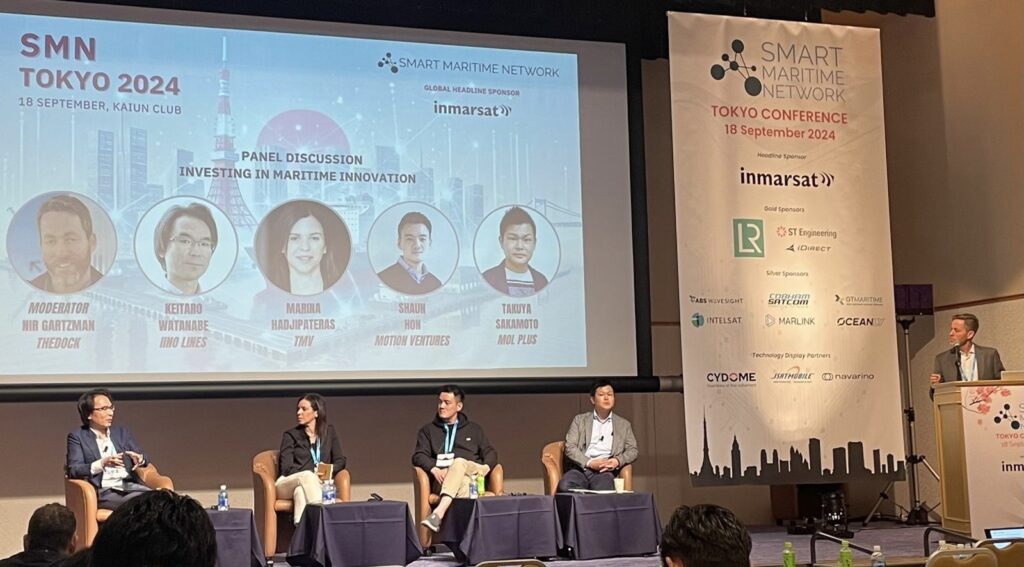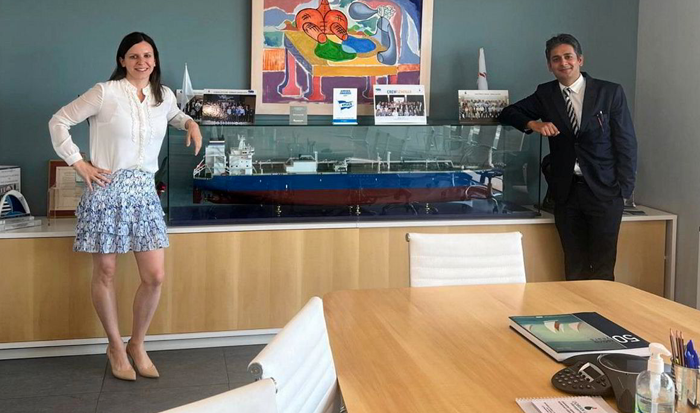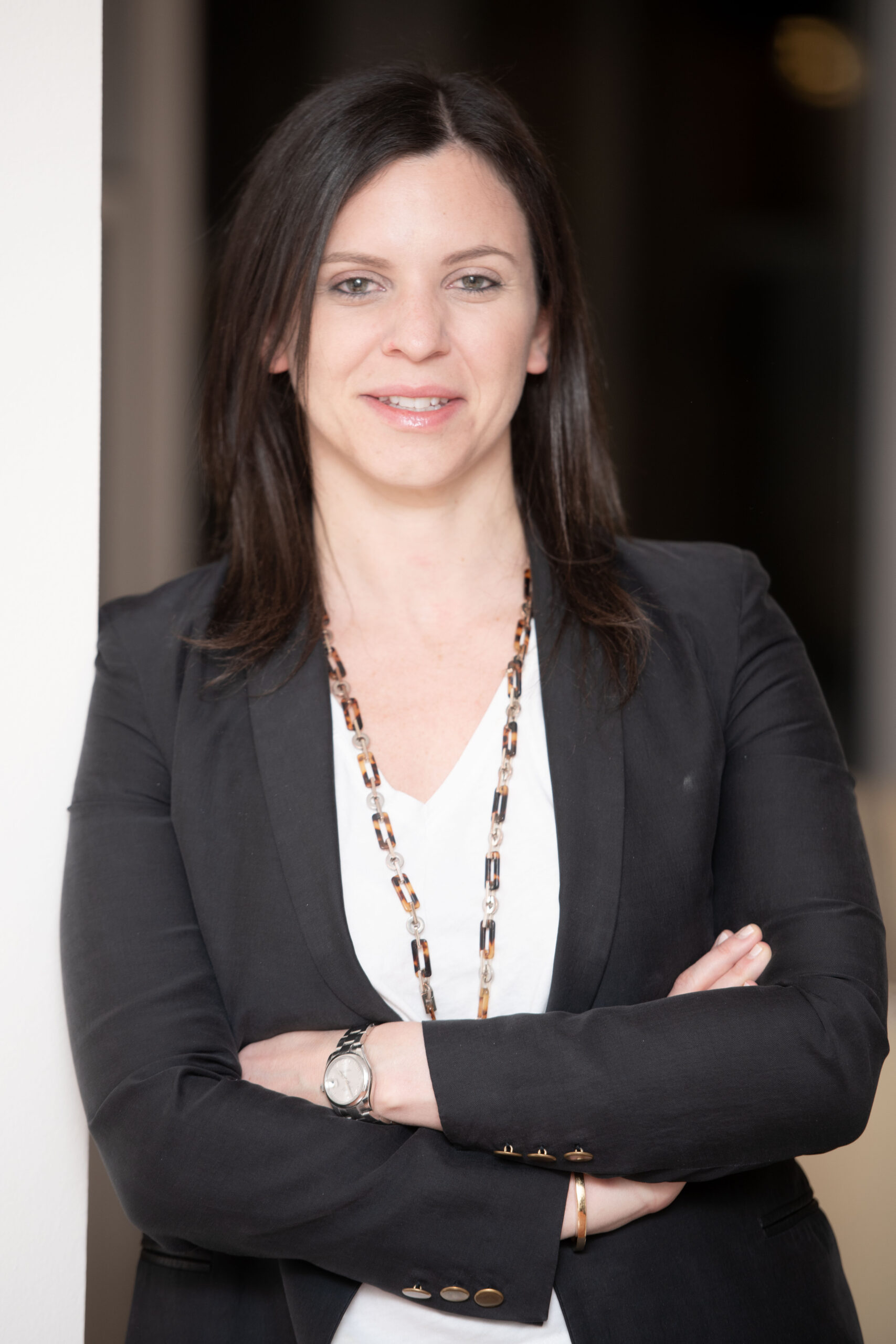TMV, headquartered in New York, is a venture capital firm that supports pioneering startups across four core sectors: “Shipping & Logistics,” “The Future of Work,” “Care,” and “Sustainability.” The firm counts IINO LINES, multiple shipowners, JPMorgan, Bank of America, and Next Era Energy among its investors.
TMV’s Co-founder, Marina Hadjipateras, has a unique background. After graduating from university, she obtained her STCW certification at a merchant marine academy and spent her early twenties in South Korea, working on a new-built Aframax project at Hyundai Heavy Industries.
We spoke to Ms. Hadjipateras about TMV’s business strategy and its investments in shipping automation technology, leveraging both her experience and TMV’s diverse portfolio of startup support.
(Text by Hiro Yamamoto)
Photo courtesy=TMV

――”TMV is a fund that invests in pioneering startups across four core sectors: Maritime & Logistics, Future of Work, Care, and Sustainability” Could you please elaborate on TMV’s philosophy and management policy as a fund that supports startups?
“TMV’s philosophy is to invest in early-stage innovators tackling legacy industries ripe for change. We selected these sectors due to their timing and conservative practices. We feel we are in the midst of a wave of digitalization in the aforementioned areas, so the timing has never been better to invest in world-class founders solving age-old problems.”
“TMV also prides itself on portfolio support. We feel uniquely positioned to invest in these spaces due to our own experience, our networks, and our ability to make warm introductions to corporates to accelerate our portfolio companies at the early stage. Moreover, our strategic LP (investor) base is uniquely positioned to offer strategic introductions, co-investments, and partnerships at the right time like Iino Lines.”

――One of the sectors TMV supports is shipping. I believe your background in this field has been particularly beneficial. Could you tell us about your relationship with the shipping industry and your career experience?
“I come from a Greek shipping family that has owned vessels since the early 19th century. Shipping is deeply embedded in our identity, and I had the opportunity to be immersed in this industry from a young age. After graduating from university, I obtained my STCW certification at a merchant marine academy and, in my early twenties, I lived in South Korea, working on a newbuild Aframax project at Hyundai Heavy Industries.”
“I then returned to the US to work at Dorian LPG, our family business based in Stamford, Connecticut, listed on the NYSE. I was closely involved in Dorian’s transition to focus on LPG (liquefied petroleum gas) shipping and later took a leading role in the IPO roadshow to list the company on the New York Stock Exchange.”
“These experiences gave me a dual perspective—both from the private, family-owned shipowner’s side in Greece and from the public, corporate side in the US. It’s this combination of backgrounds that drives me to invest in innovations that promote the modernization of the industry. Coming from a traditional shipping background, I have a deep understanding of the challenges, mindset, and barriers to change in the sector. My passion for shipping and my experience in the industry has fueled my desire to help shape its future.”

――Recently, TMV invested in Signol Limited (CEO: Michael Fanning, Headquarters: UK), a startup that provides tools using behavioral science to support greenhouse gas reduction efforts in the shipping and aviation sectors. What aspects of Signol caught TMV’s attention when setting up this fund?
“We were actively seeking investments in the shipping sector, focusing on fuel optimization and efficiency, with the aim of reducing operating costs for shipowners and cutting emissions. During our market research, we came across numerous companies offering very similar solutions. However, when we encountered Signol, it was clear that they were addressing this challenge in a truly unique and powerful way.”
“What stood out particularly was their use of behavioral science, engaging directly with crew members to identify opportunities for optimizing the propulsion of vessels (and aircraft). This approach not only reduces fuel consumption but also empowers crew members—a resource that is often underutilized in emission reduction efforts.”
“Another key factor in our decision was the quality and experience of Signol’s management team. Michael Fanning (CEO) and Gavin Laidlaw (CCO) bring a wealth of expertise, and their leadership and vision gave us great confidence in Signol’s future. Finally, we were impressed by Signol’s roadmap and its capacity to expand beyond shipping and aviation. Their ‘nudge technology,’ used to engage crews, has clear applications in adjacent areas of the logistics supply chain, including rail transport.”
―― Generally, shipping industry funds use capital to invest directly in vessels or acquire shipowners. However, TMV supports startups through a different approach, such as digital companies that assist crew members. Why did TMV choose this different approach compared to traditional shipping funds?
“We decided to start a venture capital fund and invest in innovation in the industry because of the vast past experience we had and the realization we gained knowing there was so much room for innovation in the industry. Both my colleague Joshua Gold (Investor) and I come from backgrounds in commercial shipping. I worked at Dorian LPG, and Joshua has experience as a shipbroker, speaking with shipowners daily. We understand that the shipping business is asset-heavy and have a clear sense of where the gaps are within that model.”
“Shipping is one of the last industries to embrace the digital technological advancements mankind has developed. Carbon reduction legislations are a tailwind for the sector to onboard new technology and we feel best placed with our understanding of how shipowning and managing is run to source and invest in the best startups. We have the necessary tools, know-how, and relationships to select and pick the founders and solutions to solve the most urgent pain points in the industry. Furthermore, we can open doors for our portfolio companies, which is crucial in maritime, where sales cycles can be infamously slow.”
“In the US especially, TMV stands out as one of the only funds driving innovation in this space. Startups building technology for the shipping sector need investment, but general investors tend to avoid this sector due to its complexity. TMV fills the gap in early-stage funding and plays a key role in the North American market, where investors focused on shipping are scarce.”
――What does TMV plan to invest in in the shipping and logistics sectors in the future?
“In shipping, we are actively exploring maritime automation technologies. We are convinced that automation is not a question of ‘if’ but ‘when.’ We are also focused on software solutions that enhance the visibility of emissions in shipping and port operations, helping operators meet decarbonization targets by leveraging big data.”
“In ports, we are highly interested in technologies that use AI to increase operational efficiency. As new solutions are introduced and integrated, we are mindful of balancing automation with the workforce. We are particularly excited about startups improving intermodal logistics, especially in commercial trucking and freight rail. Ports are the hubs of international trade, but it’s the trucks and railways that move cargo in and out of these commercial centers. We see significant potential in the freight rail industry due to its superior cost efficiency and low carbon emission profile for long-haul transportation, and we are actively seeking more startups in this space.”
■Profile: Marina Hadjipateras
Marina Hadjipateras holds a degree from Georgetown University. She began her career at Dorian LPG, where she was closely involved in the company’s transition to becoming a specialized LPG shipping company. Marina also played a key role in Dorian’s IPO, leading the roadshow that ultimately listed the company on the New York Stock Exchange. Before co-founding TMV, Marina gained significant experience working on shipbuilding projects at Hyundai Heavy Industries and holds an STCW certification from a merchant marine academy.
〆TMV、海運自動化の技術に投資。『ナッジ技術』を応用、日本市場に注目。
ニューヨークに本社を置くTMVは、スタートアップ企業を支援するベンチャーキャピタルだ。同社は「海運」「物流」「未来の働き方」「ケアと持続可能性」という4つの基本理念を掲げる。TMVの投資家には、飯野海運、複数の船主、JPモルガン、バンク・オブ・アメリカ、ネクステラ・エナジーらが名を連ねる。TMVの共同商業者であるマリーナ・ハジパテラス氏に同社のスタートアップ支援ポートフォリオ使った事業戦略、海運自動化技術への投資の可能性について聞いた。
(聞き手 山本裕史)
続きは日本海事新聞で読むことが出来ます。
